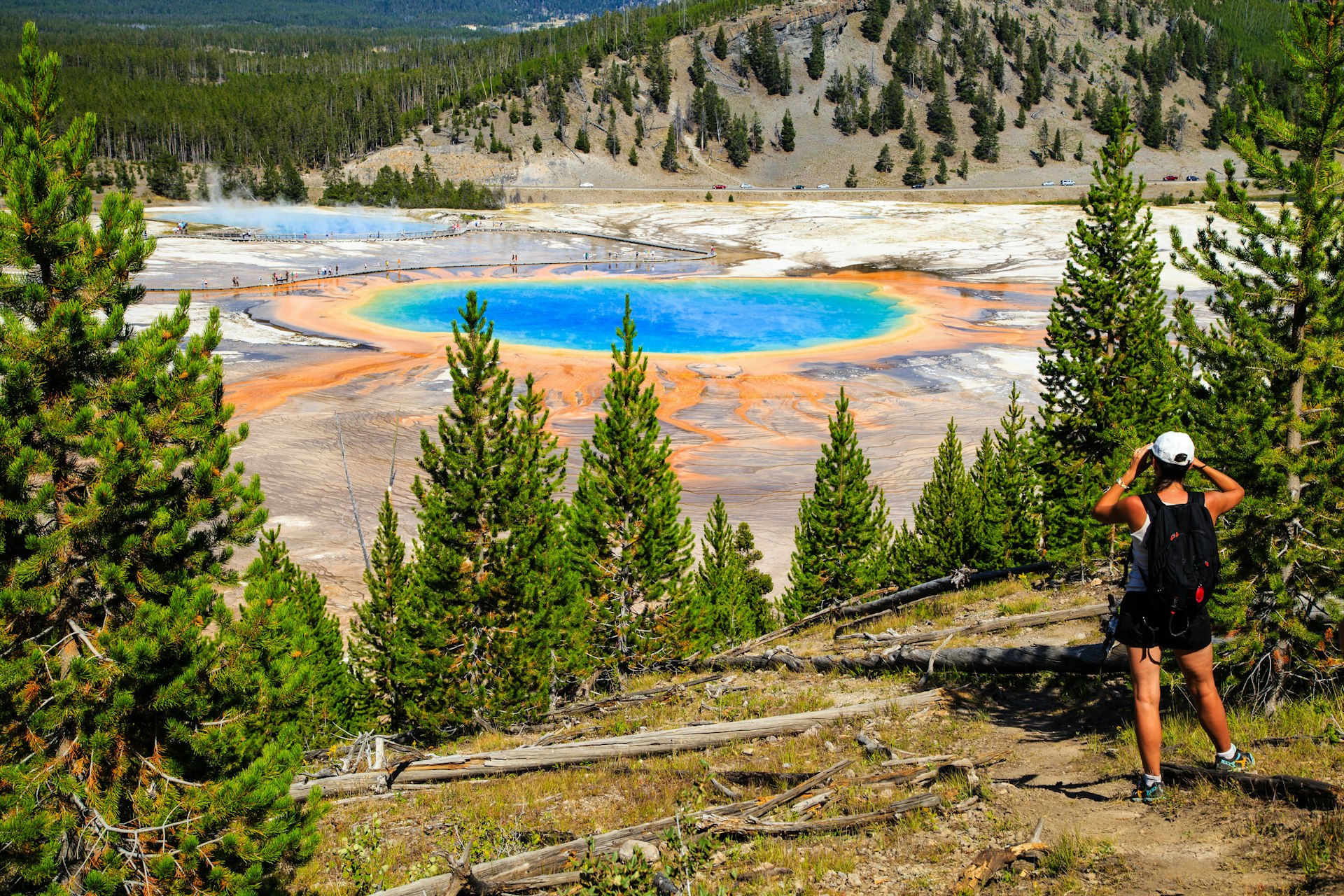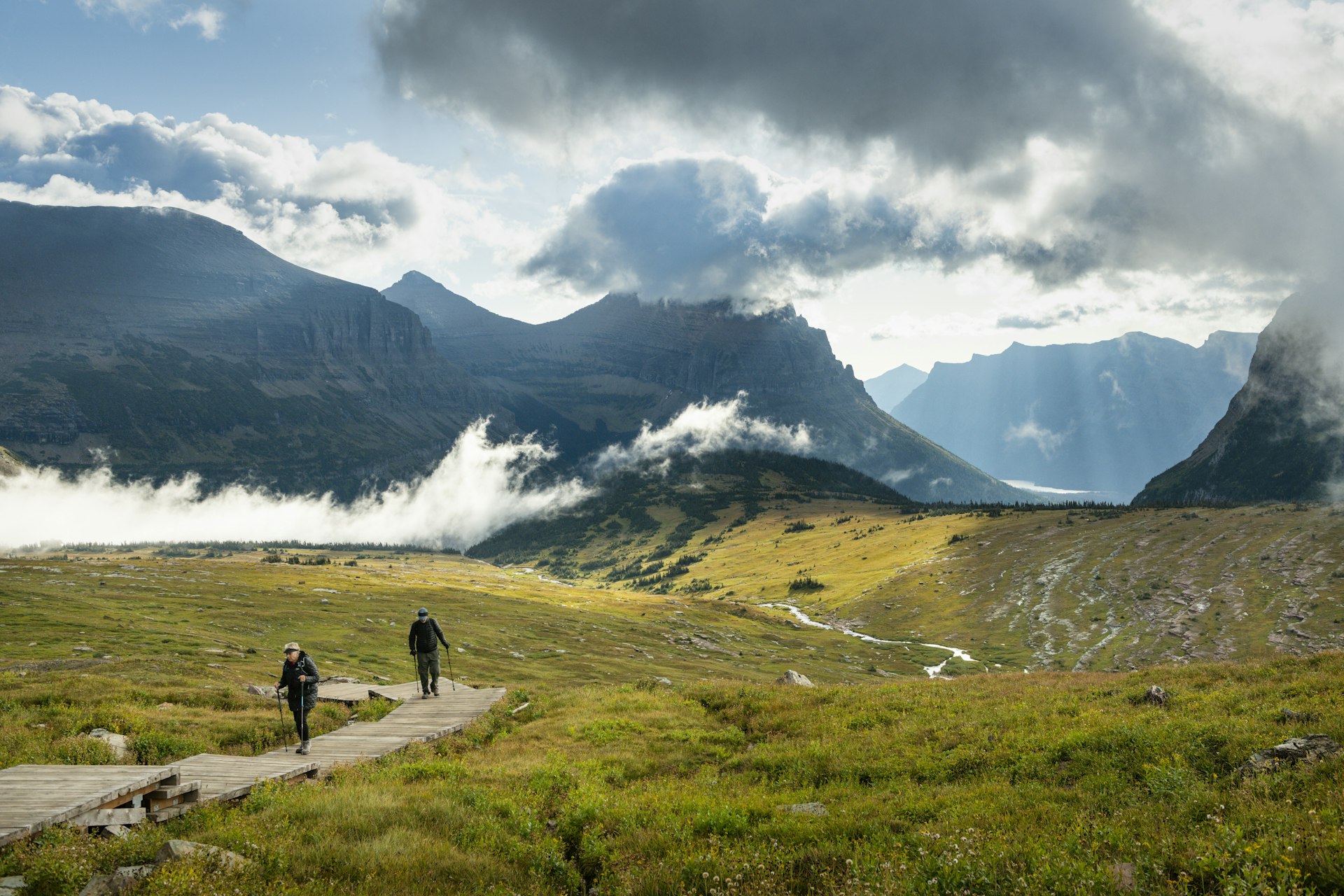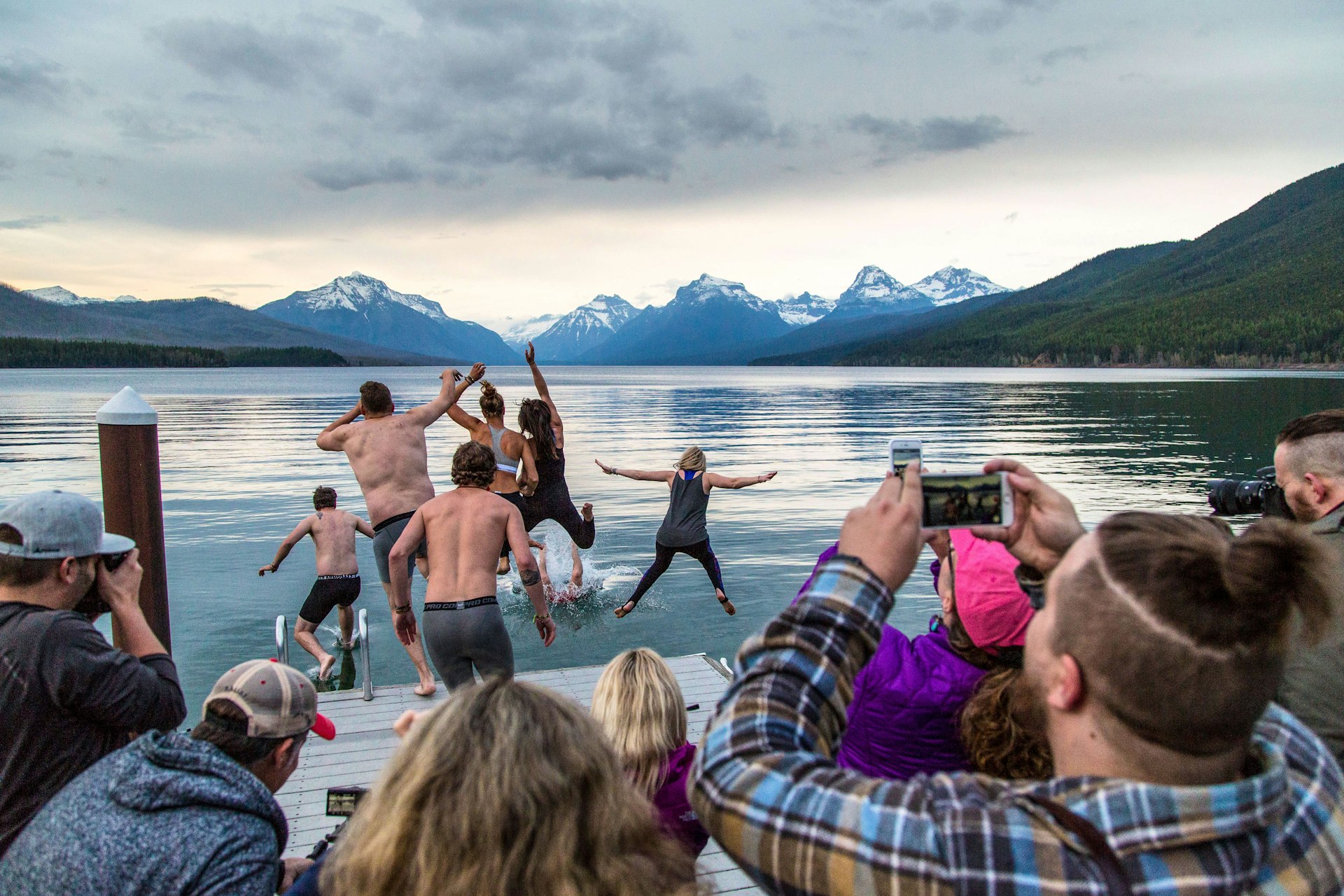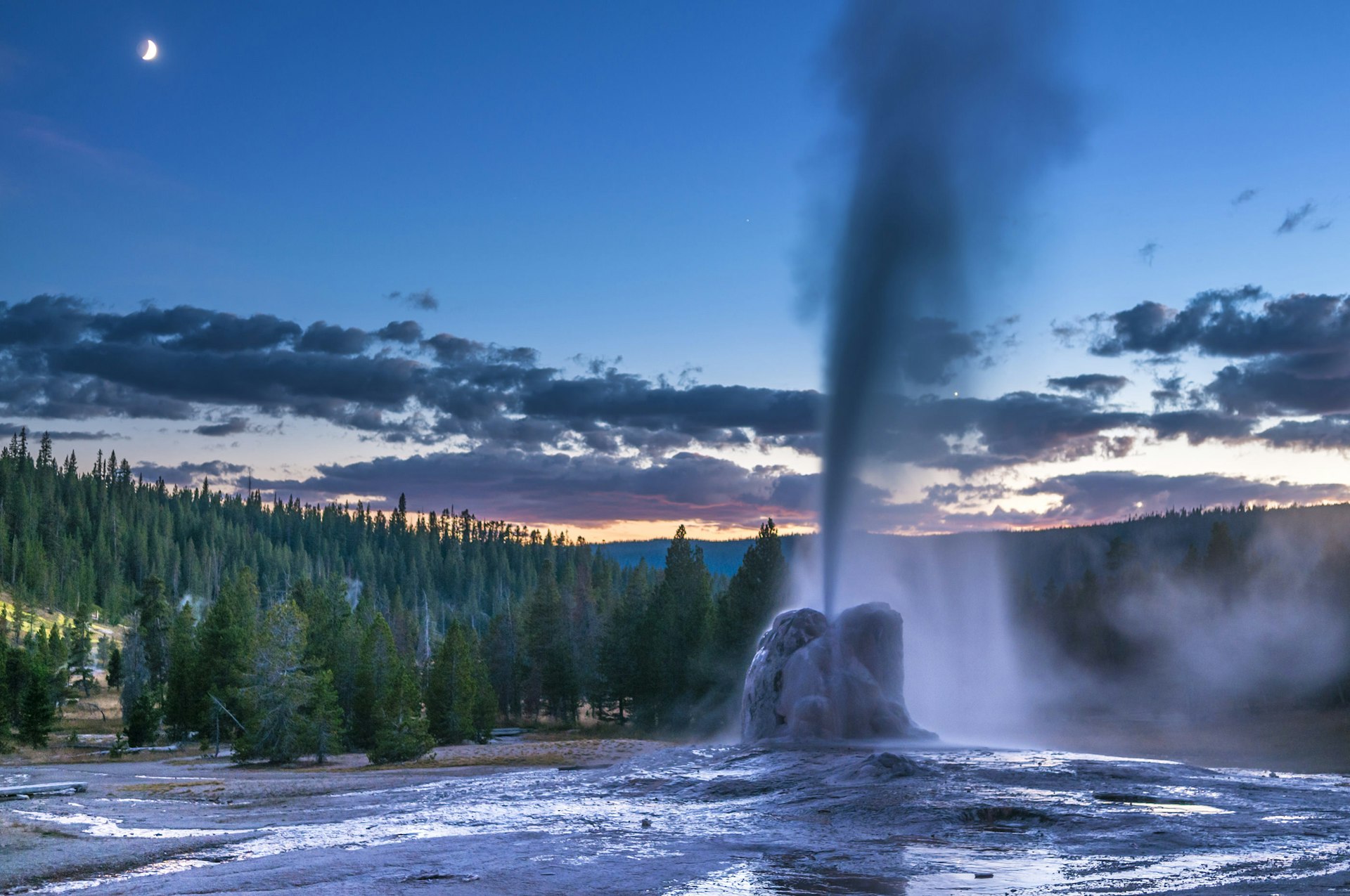When it comes to natural beauty in the USA, Montana sets the gold standard.
The state’s rugged mountains, endless forests and rich wildlife remain mostly pristine thanks to wilderness-preservation programs and low population numbers, which allows outdoorsy types to enjoy all that Montana has to offer. Given Montana’s unparalleled natural attractions, it’s no surprise that the first national park in the United States was established here.
While it’s true that Yellowstone National Park is shared with neighboring Wyoming and Idaho, Montana is the primary gateway to this slice of America’s natural history, with thermal features and wild animals you’ll find nowhere else in the country (or the world). While Yellowstone showcases the American West as it once was, Glacier National Park – entirely within Montana, even if its geologic features extend into Canada – offers some of the state’s best hikes, with endless trails, towering cliffs and sparkling lakes galore to explore.
Yellowstone National Park is the Montana’s best national park for natural history
It’s easy to see how Yellowstone National Park inspired the expanding United States to preserve sections of American wilderness. In 1872, at a time when westward expansion was still relatively unmitigated, it was Yellowstone’s iconic and unique features that inspired forward-thinking planners to designate this treasure as a federally protected area.
Today, the park is not just one of the best places to visit in Montana – it regularly tops the list for the entirety of the USA. When people visit, it’s to see the same sights that captivated people in the 1800s: dazzling hydrothermal features and unparalleled wildlife. Bubbling hot pots and more than 500 bursting geysers can be found throughout the 3471-sq-mile park. The most well known is Old Faithful, a relatively predictable eruptor. Scattered among the waterworks are herds and packs of some of America’s most recognizable animals, including bison, gray wolves, grizzly bears, elk and bald eagles. Seeing wildlife is one of the reasons more than four million visitors come here annually, predominantly during the summer.
Yellowstone’s most memorable attractions begin outside the park in Gardiner, the gateway to the park’s north entrance, where the famous Roosevelt Arch can be found. (A line of cars winding beneath the gate is standard any time of day in the summer, so getting a photo isn’t too hard.) Just inside the west entrance is the town of Mammoth, including the spires of Mammoth Hot Springs, another popular photo spot. There are often elk wandering around Mammoth – but be sure not to approach, feed or touch them. Also, take care never to walk between a bull and any of his cows, as he’ll take that as an act of aggression.

Other popular attractions include the multicolored Grand Prismatic Spring, the largest hot spring in the United States. Its otherworldly orange-blue colors are best viewed not from the boardwalk winding through the spring, but from a nearby elevated platform on the Fairy Falls trail. Yellowstone Canyon (also called the “Grand Canyon of Yellowstone”) is another photo op most visitors don’t want to miss. Park at Artist Point to view the canyon and Lower Falls in all their glory.
In addition to geological features, the park is also known for Old Faithful Inn, a historic wood-and-stone landmark next to the geyser of the same name. It’s a great place to stop for lunch or just to explore the antique architecture (to stay there overnight, expect to book 12 to 24 months in advance). Hayden and Lamar Valleys are the most reliable spots to find Yellowstone’s wildlife, particularly the predator species. Bison are fairly difficult to miss anywhere in the park.

Visiting Yellowstone National Park
Taking a trip to Yellowstone will require some planning, especially during July and August when it’s busiest. Hotels like Old Faithful Inn and Roosevelt Lodge are two options offering in-park accommodation, and there are also 12 campgrounds with over 500 sites within the park. The gateway towns of Gardiner at the north entrance and West Yellowstone at the west entrance are the closest towns to stay in outside the park’s borders; Bozeman, which has the nearest airport, is equidistant from both entrances. Livingston, Big Sky and Paradise Valley also offer accommodations with relatively close access to the park. In every case, booking ahead will be essential during the high season.
When visiting Yellowstone during winter, only the road from the north entrance in Gardiner to Cooke City is open. Some accommodations may be closed during this time, but there are enough available rooms to sustain the minimal crowds. This is the best time to see wolves and other wildlife that have congregated in the Lamar Valley for the winter. Cooke City is also a very common spot to find snowmobilers, though winter travelers are unlikely to encounter them in the vast park. In any case, come prepared for freezing temperatures and suboptimal driving conditions.
Entering Yellowstone is not free (except on fee-free days): a fee of $35 is required for each standard vehicle – highly recommended so as to explore the park independently. Alternatively, consider a National Park Pass for $80, which provides a year’s access to every national park in the country. Military personnel (including veterans) and 4th graders may acquire annual passes for free. Once in the park, no site is fee-restricted.

Glacier National Park is Montana’s best national park for hiking
Driving into Glacier National Park, it’s clear why this special section of the country needed to be protected from development. Here, towering mountain peaks overlook crystal blue lakes surrounded by dense pine forest, all home the largest concentration of grizzly bears in the world.
While hiking trails are the star attractions in Glacier National Park, there is a lot to see even for non-hikers. Kayaking Lake McDonald is a great way to take in the scenery, as is photographing the multicolored river stones beneath the shockingly clear (and cold) water. Driving Going To The Sun Rd, an east-west drive transecting the park, is so in demand it can lead to traffic jams during busier times (generally July and August).
When it comes to hiking, there is no shortage of options. More than 700 miles of trails are accessible, most leading to stunning views unlike anywhere else in the country. The most traversed of these include the hike to Avalanche Lake, a relatively flat and easy trek. Grinnell Glacier Hike, which leads to a glacier and its lake on the eastern side of the park, is a 10-mile out-and-back with 2000ft of elevation gain. Along the way, you’ll enjoy stunning views of the park’s characteristic cliffs and the green valleys below them. Reachable from the parking lot at Logan Pass, the Highline Trail is another must-hike. The Hidden Lake Trail is, too.

Visiting Glacier National Park
Like Yellowstone, visiting Glacier National Park requires some serious advance planning. Its roads, hotels and trails are all seasonal, and the park’s popularity has skyrocketed in recent years as going on road trips and #VanLife have swept the country.
Glacier National Park has seven entrances in total, three of which connect to Going To The Sun Rd. The most-used entrances are at West Glacier on the western side of the park and the east entrance at St Mary. Both of these are open year-round but may have closures due to snow; the east entrance, on tribal land, may close by decree of the Blackfeet Nation.
There are several options for hotels within the park’s boundaries, including the historic Many Glacier Hotel and Lake McDonald Lodge. There are plenty of campgrounds, some of which take reservations, others first come, first serve. You can also obtain a backcountry permit for wilderness camping.

Outside the park, several gateway towns with hotels and campgrounds are concentrated by the park’s west side. West Glacier is the closest town on the park’s border, with West Glacier Village offering cozy cabins and an RV park that are the perfect starting point for a Glacier adventure. Thirty miles west is the ski resort town of Whitefish, south of which is Kalispell, a relatively larger city that hosts Glacier Park International Airport (FCA). On the east side, the Tiny Homes at St Mary Village offer a unique option for accommodations.
As with Yellowstone, booking far in advance is recommended for trips from June to September. Under The Big Sky Festival takes place in Whitefish in mid-July, causing serious competition for even the least desirable campsites.
Entering Glacier in a standard vehicle costs $35 (except on fee-free days), unless you have the $80 National Park Pass, or are a military veteran or 4th grader with the respective annual pass. In 2021, a $2-per-vehicle ticket was required to access Going To The Sun Rd between 6am and 5pm during the summer months. Getting the permit was competitive and not always guaranteed, and while it’s possible to see parts of the park while avoiding GTTSR, it’s not easy or recommended.
